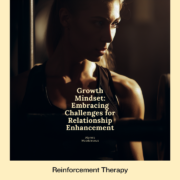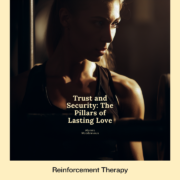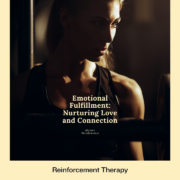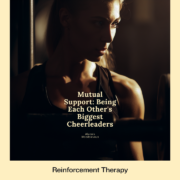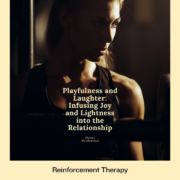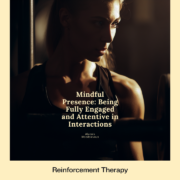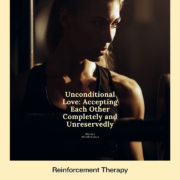When it comes to romantic relationships, you are both on a never-ending journey towards the idea that you are experiencing growth. The latter you’re able to see when you stop and look back at where you were yesterday, last year or five years ago. and lasting love is shaped by various factors.
To reach the goal, which you probably never will, you can combine several concepts to help you both navigate your shared life. These concepts are reinforcement (primary and secondary), cognitive restructuring and the concept of constant and never-ending improvement.
When you understand these concepts and integrate them into your relationship, you foster a state of positive change, personal development and enduring connection. In this article we are exploring theses concepts and how the intertwine. We also look at how they can be harnessed to pave the way on your journey.
First, let’s kick things of with looking at the concepts of primary and secondary reinforcement:
I. Understanding Primary and Secondary Reinforcement in Relationships
- Primary Reinforcement: Tapping into Innate Needs and Desires
- Meeting emotional needs: Primary reinforcement in relationships involves fulfilling each partner’s emotional needs, such as love, affection, and support.
- Building trust and security: Primary reinforcement strengthens the foundation of a relationship by fostering trust, providing a safe space for vulnerability, and creating a sense of security.
- Secondary Reinforcement: Learned Associations and Conditioning
- Celebrating milestones and accomplishments: Secondary reinforcement in relationships involves acknowledging and rewarding shared milestones and individual achievements, reinforcing positive behaviors and fostering motivation.
- Encouraging growth and personal development: Secondary reinforcement is present when partners support and encourage each other’s personal growth, empowering them to reach new heights individually and as a couple.
II. The Role of Cognitive Restructuring in Romantic Relationships
- Challenging Negative Beliefs and Assumptions
- Identifying relationship myths: Cognitive restructuring helps couples recognize and challenge negative beliefs or assumptions about relationships, such as “love should always be effortless.”
- Reframing conflicts: Cognitive restructuring enables partners to reframe conflicts as opportunities for growth and understanding, fostering effective communication and problem-solving.
- Fostering Positive Self-Talk and Empowering Mindsets
- Promoting self-compassion: Cognitive restructuring encourages partners to replace self-critical thoughts with self-compassion, nurturing a supportive and understanding inner dialogue.
- Cultivating a growth mindset: Cognitive restructuring helps partners adopt a growth mindset, embracing challenges and seeing them as opportunities for learning and personal development.
III. Constant and Never-Ending Improvement in Romantic Relationships
- Embracing Growth as Individuals and as a Couple
- Committing to personal development: Constant and never-ending improvement involves both partners actively seeking personal growth and encouraging each other’s individual journeys.
- Joint exploration and learning: Couples can engage in shared activities, attend workshops, or learn new skills together, fostering mutual growth and creating a strong sense of connection.
- Evolving Together Through Communication and Feedback
- Creating an open feedback loop: Constant improvement requires open and honest communication, with partners providing constructive feedback and actively listening to each other’s needs and concerns.
- Embracing change and adaptability: Partners must be willing to adapt and evolve as individuals and as a couple, embracing change as an opportunity for growth rather than a threat.
IV. Nurturing Lasting Love Through Reinforcement and Cognitive Restructuring
- Applying Primary and Secondary Reinforcement in Everyday Interactions
- Expressing love and appreciation: Partners can use primary reinforcement by regularly expressing love, appreciation, and gratitude towards each other.
- Reinforcing positive behaviors: Secondary reinforcement can be utilized by acknowledging and rewarding behaviors that contribute to a healthy and thriving relationship.
- Embedding Cognitive Restructuring into Relationship Dynamics
- Practicing empathy and understanding: Cognitive restructuring encourages partners to step into each other’s shoes, fostering empathy and understanding during challenging moments.
- Fostering a positive mindset: Partners can employ cognitive restructuring techniques to reframe negative thoughts and cultivate a positive outlook on the relationship.
Conclusion:
In a romantic relationship, the concepts of primary and secondary reinforcement, cognitive restructuring, and constant and never-ending improvement intertwine to create a path towards constant growth and lasting love. By embracing the principles of reinforcement, actively engaging in cognitive restructuring, and committing to personal and relational development, couples can foster an environment of positive change, empathy, and continuous improvement. With these tools, partners can embark on a journey of profound transformation and build a resilient, fulfilling, and enduring romantic connection.


